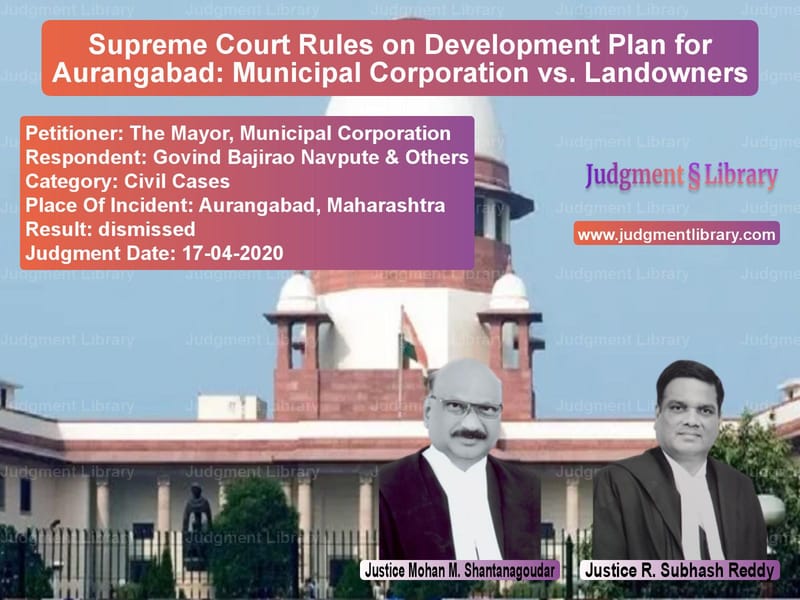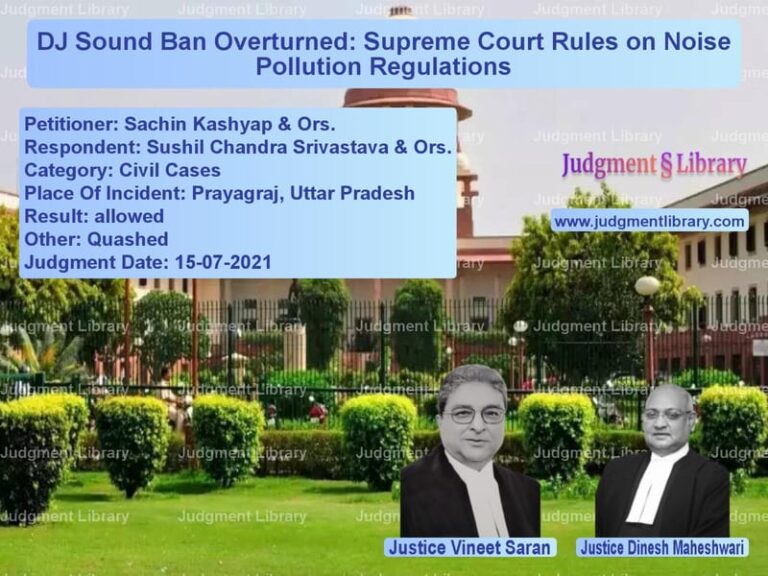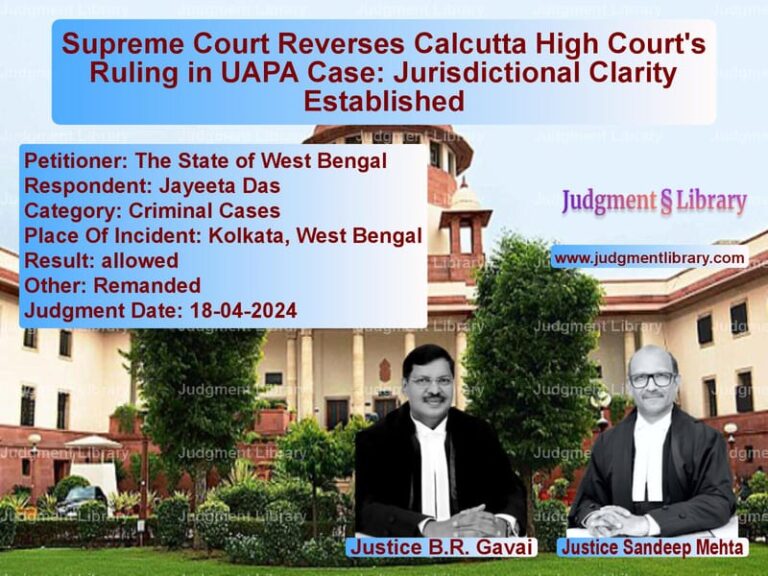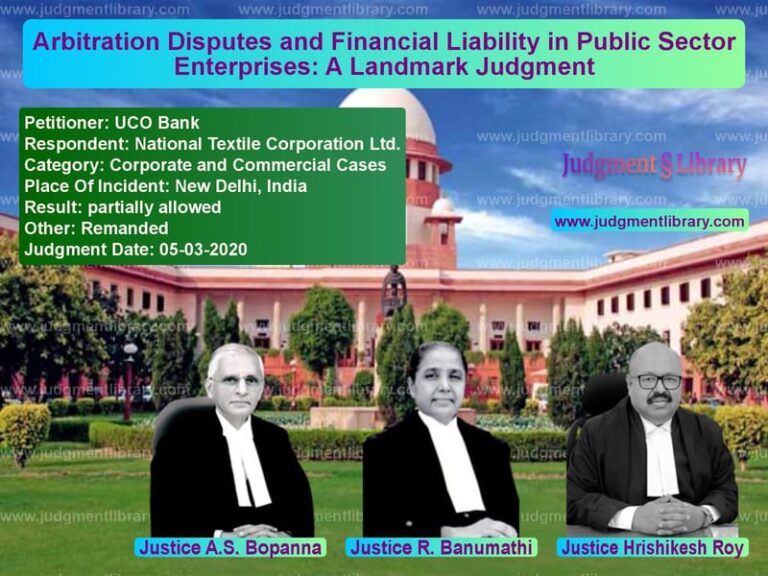Supreme Court Rules on Development Plan for Aurangabad: Municipal Corporation vs. Landowners
The case of The Mayor, Municipal Corporation vs. Govind Bajirao Navpute & Others revolved around the validity of the Draft Development Plan (DDP) for the city of Aurangabad, Maharashtra. The dispute arose when the Municipal Corporation published the DDP under the Maharashtra Regional and Town Planning Act, 1966 (MRTP Act), but landowners challenged it on the grounds of delay, irregularities, and unauthorized modifications. The Supreme Court ultimately upheld the High Court’s ruling that the delay and modifications rendered the plan invalid, affirming that the preparation of the development plan must adhere to statutory timelines.
Background of the Case
Aurangabad underwent significant territorial expansion when 18 villages were included within municipal limits in 1982, followed by the denotification of CIDCO areas, further increasing the city’s jurisdiction. To accommodate this growth, a new development plan was to be formulated under the MRTP Act. However, the process suffered significant delays:
- On 7th February 2013, a declaration was published under Section 23(1) of the MRTP Act, initiating the process for revising the development plan.
- On 5th February 2013, the Town Planning Officer was appointed for drafting the new development plan.
- Under Section 26 of the MRTP Act, the draft plan was required to be published within two years, i.e., by February 2015. However, the notification was issued only on 4th February 2016.
- Subsequent extensions were granted post-facto, raising legal concerns over their validity.
Petitioners’ Arguments (Landowners)
The landowners challenged the DDP on multiple grounds:
- “The statutory timeline prescribed under Section 26 of the MRTP Act is mandatory, and the failure of the planning authority to adhere to it renders the DDP invalid.”
- “Several modifications were made to the plan at the behest of political influences, including the deletion of 361 public amenities, changes in land use for 500 hectares of forest and water bodies, and alteration of major roads without lawful justification.”
- “The extension of the deadline beyond the statutory period was granted without proper jurisdiction, making the entire process unlawful.”
- “By delaying the plan and modifying it arbitrarily, the planning authority violated the principles of urban planning and citizens’ rights to an equitable urban landscape.”
Respondents’ Arguments (Municipal Corporation)
The Municipal Corporation defended its actions, arguing:
- “The preparation of a development plan is a complex process, and delays are sometimes unavoidable due to administrative and technical reasons.”
- “The modifications made to the DDP were within the authority of the Municipal Corporation and were intended to accommodate changing urban needs.”
- “The development plan was still at a proposal stage and had not yet been finalized by the state government, making the legal challenge premature.”
- “The statutory provisions allow for extensions, and the competent authority had granted the necessary extensions to complete the drafting process.”
Supreme Court’s Observations
The Supreme Court analyzed the validity of the DDP in light of the MRTP Act:
- “The planning authority failed to prepare and publish the draft development plan within the time frame prescribed under Section 26 of the MRTP Act, which is a statutory requirement.”
- “The High Court correctly ruled that the failure to comply with statutory timelines deprived the Municipal Corporation of its authority to finalize the DDP.”
- “The ex post facto extensions granted to validate the delay in submission of the plan were beyond the jurisdiction of the Director of Town Planning.”
- “Modifications made to the plan, including the deletion of public amenities and reclassification of major land parcels, were arbitrary and lacked statutory backing.”
The Court remarked: “Urban planning must be undertaken in a structured and transparent manner, ensuring that deviations from statutory processes do not compromise the integrity of city development.”
Final Judgment
Based on its findings, the Supreme Court upheld the High Court’s ruling and:
- Declared the draft development plan notification dated 4th February 2016 as invalid.
- Ruled that any extension granted beyond the statutory period was unlawful and could not be relied upon.
- Directed that the preparation of the development plan be undertaken by the concerned Divisional Joint Director or Deputy Director of Town Planning, as per Section 21(4A) of the MRTP Act.
Implications of the Judgment
This ruling has significant implications for urban planning and municipal governance:
- Municipal authorities must strictly adhere to statutory timelines when preparing development plans.
- Unlawful modifications in development plans can be challenged by affected landowners and stakeholders.
- Planning authorities cannot arbitrarily alter land use designations without due process and legal justification.
- State intervention may be necessary in cases where municipal corporations fail to fulfill their planning responsibilities.
The judgment reinforces the principle that urban development must follow legal frameworks and procedural integrity to ensure equitable city planning.
Petitioner Name: The Mayor, Municipal Corporation.Respondent Name: Govind Bajirao Navpute & Others.Judgment By: Justice Mohan M. Shantanagoudar, Justice R. Subhash Reddy.Place Of Incident: Aurangabad, Maharashtra.Judgment Date: 17-04-2020.
Don’t miss out on the full details! Download the complete judgment in PDF format below and gain valuable insights instantly!
Download Judgment: The Mayor, Municipal vs Govind Bajirao Navpu Supreme Court of India Judgment Dated 17-04-2020.pdf
Direct Downlaod Judgment: Direct downlaod this Judgment
See all petitions in Property Disputes
See all petitions in Public Interest Litigation
See all petitions in Landlord-Tenant Disputes
See all petitions in Judgment by Mohan M. Shantanagoudar
See all petitions in Judgment by R. Subhash Reddy
See all petitions in dismissed
See all petitions in supreme court of India judgments April 2020
See all petitions in 2020 judgments
See all posts in Civil Cases Category
See all allowed petitions in Civil Cases Category
See all Dismissed petitions in Civil Cases Category
See all partially allowed petitions in Civil Cases Category







